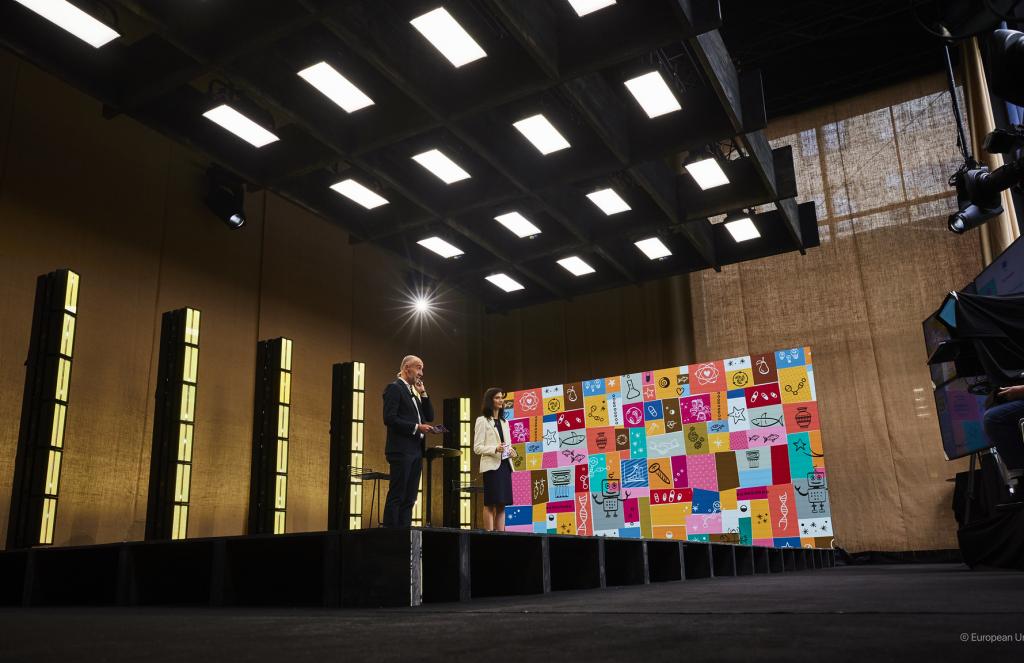Thessaloniki gets ready for its metro launch in November
The underground rapid transit lines have been under construction for almost two decades due to various project delays
 TheMayor.EU logo
TheMayor.EU logo 
Commissioner Gabriel offered a poignant perspective on the future of innovation in the EU, Source: European Union
The two-day event showed that there is large and multi-level potential to make EU the global leader in innovation
Earlier today, the final session of the European Research and Innovation Days 2021 took place with concluding remarks from EU Commissioner Mariya Gabriel and Director-General of DG Research and Innovation Jean-Eric Paquet. They were glad to announce that this year’s edition of the premier flagship event could be considered a definite success having attracted more than 21,000 registered participants from 105 countries.
The two officials summarized the main takes from the mega-conference and also shone some light on what is next for research, innovation and entrepreneurship in the European Union.
This year, the Research and Innovation Days brought the idea of innovation and ongoing projects closer to the public as a way to make them more relevant and relatable. A big role in that played the Research and Innovation Exhibition, which featured more than 100 such projects. The Exhibition was visited by 8000 participants and the good news is that it will remain available for viewing in the future so those who have not had a chance to explore the ideas contained in it can now do so without a rush.
The two-day event consisted of 70 sessions and workshops, which resulted in 230 appointments with project officers for consultations. Since research and innovation span and bridge many distant fields of human life the implications of this event are numerous.
Still, Commissioner Mariya Gabriel, who was the main figure behind the organization, was also there to offer concluding guidelines and her perspective on what it all meant.
Commissioner Gabriel summarized the philosophy of the event and what it meant for Europeans, hopeful to see the place they live in becoming a role model in research and innovation on a global scale. She also revealed that she would like to see the creation of a European Innovation Area to complement the European Research Area and the European Education Area as the third missing link to boost groundbreaking innovation.
She also emphasized that co-creating and co-designing were great first steps, but these needed to be succeeded by co-implementation steps and a common follow-up process for continental projects under the Horizon Europe umbrella.
Bringing citizens on board and winning their trust was just as essential, in her view, as they would provide the impetus to innovation if they were not only recipients of its products and services but also active participants in its conceiving.
Commissioner Gabriel called for synergies between research and innovation and the Recovery & Resilience Plan, as a way to ensure that the innovative field would assume a truly strategic role in the wake of the COVID pandemic.
Finally, she stressed on the importance of also involving the Member States and regions and reminded viewers about the Joint Action Plan that the European Commission signed with the European Committee of the Regions in November 2020, as an example of the closer cooperation between the various levels of administrations in the Union.
Director-General Paquet also reminded the audience that what is next to come is the Horizon Europe 2021 Info Days event taking place between 28 June and 9 July. This will give the chance to participants to delve deeper into the different clusters which compose the Horizon Europe programme.
If you want to keep up with how European cities and regions are changing, follow us on Facebook, Twitter and Instagram.

The underground rapid transit lines have been under construction for almost two decades due to various project delays

Now you can get your wine in Talence by paying directly in Bitcoin

That’s because the state has to spend money on updating the railway infrastructure rather than subsidizing the cost of the popular pass

Rethinking renewable energy sources for the urban landscape

The examples, compiled by Beyond Fossil Fuels, can inform and inspire communities and entrepreneurs that still feel trepidation at the prospect of energy transition

Now you can get your wine in Talence by paying directly in Bitcoin

The 10th European Conference on Sustainable Cities and Towns (ESCT) sets the stage for stronger cooperation between the EU, national and local level to fast track Europe's transition to climate neutrality.

At least, that’s the promise made by the mayor of Paris, Anne Hidalgo

The underground rapid transit lines have been under construction for almost two decades due to various project delays

At least, that’s the promise made by the mayor of Paris, Anne Hidalgo

Hostal de Pinós is located in the geographical centre of the autonomous region

Despite its church-y name, the district has long been known as the hangout spot for the artsy crowds

Urban dwellers across the EU are having a say in making their surroundings friendlier to people and the environment.

Forests in the EU can help green the European construction industry and bolster a continent-wide push for architectural improvements.

Apply by 10 November and do your part for the transformation of European public spaces

An interview with the Mayor of a Polish city that seeks to reinvent itself

An interview with the newly elected ICLEI President and Mayor of Malmö

A conversation with the Mayor of Lisbon about the spirit and dimensions of innovation present in the Portuguese capital














